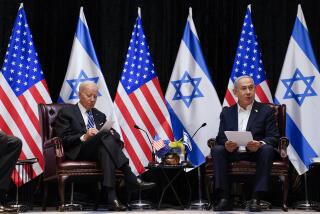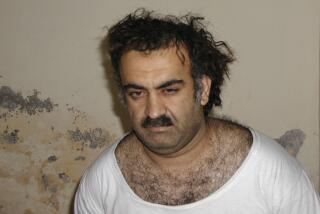Fighting terrorism post-Gitmo
Today’s topic: President Obama announced plans to close the Guantanamo Bay detention camp within a year. How big a policy shift is that, and how should the administration handle enemy combatants -- not just those in Gitmo today, but the ones apprehended in the future? All week, Hugh Hewitt and Susan Estrich debate Obama’s first days in office.
Obama wants to defeat terrorists. But how will he do it?
Point: Hugh Hewitt
It is always fun to work with you Susan, and I am very interested in your take on what will happen to the Gitmo terrorists. Leavenworth? The ADX “supermax” in Colorado (which doesn’t seem to have the space available)?
And what procedures are you expecting the new administration and Congress to fashion? I doubt President Obama’s legal team is really going to recommend mainstreaming these killers into the U.S. court system in an endless series of replays of the Zacarias Moussaoui trial. But you tell me, Susan.
The capture and interrogation of Islamist terrorists committed to the global jihad remains one of the most important defenses in the long war, and I know you agree with that. But where do you recommend such prisoners be held? Afghanistan is clearly going to become a default holding facility, but does locating high-profile prisoners within striking range of the terrorists’ network of bases make sense? And given the possible reach of the Supreme Court’s Boumediene vs. Bush decision, does it even matter anymore where the terrorists are kept while being interrogated?
Thursday’s executive order to close the prison at Guantanamo Bay was followed by Friday’s missile attack on a Pakistani target that left at least 18 dead, so we know the new president is on board with the most lethal of the tactics employed by the Bush administration in the war against the jihadists.
What we don’t know is how committed Obama is to the variety of defenses employed by the Bush administration after 9/11, and hopefully we’ll never know about some of the defenses at all. I hope the New York Times, the Los Angeles Times and others in the mainstream media give the new president a better shot at keeping our national security secrets under wraps. Blowing the whistle on the surveillance of terrorist financing schemes wasn’t helpful to the nation’s security when these papers did so in June 2006, and one great benefit of the arrival of the new president might be the rediscovery on the part of the elite media of a desire to actually help America prevail in the battle against terrorists.
It was very easy to be against President Bush and propose a better approach to fighting the war, operating Gitmo and ensuring national security. Yes, no attacks on the homeland occurred after 9/11, but we both have heard arguments that Bush had nothing to do with this and that the terrorists are shattered after their one lucky- though-very-lethal punch in 2001. The new and gifted president has many plans for righting the wrongs done by the previous administration.
In his inaugural address, Obama delivered a blunt statement to jihadists around the globe: “You will not outlast us. We will defeat you.” I and my colleagues on the center-right were cheered by this, but we were also curious as to the “how.” We know what weapons he isn’t going to use -- Gitmo and “enhanced interrogation techniques.” Which ones do you think he’s going to keep, Susan? Besides the missile-launching drones, that is.
Hugh Hewitt if a law professor at Chapman University and host of a nationally syndicated radio show aired in Southern California on KRLA-AM (870) and in New York on WNYM-AM (970). His two most recent books are “The War Against the West” and “GOP 5.0: Republican Renewal Under President Obama.”
We don’t know they’re terrorists unless we try them
Counterpoint: Susan Estrich
Try them.
The short answer to what to do with the Gitmo detainees is simply this: Charge them. Try them. Publicly and fairly. If proved guilty, punish them.
It is a great pleasure for me to debate you, Hugh, because we share a fundamental belief that people who disagree can do so with civility and respect. But we share something even more fundamental: a belief and commitment to the rule of law. It is what we teach, the civic religion we do our best to train our students to practice with honor.
I do not question the motives of your friends in the Bush administration, Hugh. Some of them are my friends as well. But in fundamental respects, they were wrong. Guilt must be proved and established fairly and impartially, not assumed by affixing the label, “enemy combatant,” much less “terrorists committed to jihad.” The facts must be found by impartial tribunals made up of judges, not combatants. Torture is not only wrong but ineffective. It is wrong because it debases us in the eyes of the world and endangers our own soldiers who serve in harm’s way.
But still, you ask, what if torture might save your loved one? The answer is that it won’t. Life doesn’t work the way Jack Bauer does on “24,” and a prison camp set up on that model, as Gitmo was, is doomed to failure -- and Gitmo has failed. Virtually every expert on interrogation, military and civilian, affirms that torture does not yield valuable intelligence. The detainee (or more accurately, the victim) will tell the interrogator (or more accurately, the torturer) anything to stop the pain. Anything won’t save your loved one.
A friend of mine recently reminded me of what happened not so long ago in our last experiment with secret military tribunals, when eight Germans landed on the East Coast shortly after the U.S. entered World War II. The FBI claimed to have “caught these spies,” but two of them actually tried to turn themselves in before they were “caught” and had been dismissed as cranks. The government spared itself the obvious embarrassment; all eight were charged and tried before a military commission, convicted and sentenced to death. Six were executed; the two who were initially rebuffed in their efforts to turn themselves in were ultimately granted executive clemency years later by President Truman.
What difference would a civilian trial have made? For the “real” Nazis, perhaps none. The point is, they would have been convicted anyway. But the innocent Germans, the ones who never intended to harm our country and turned on the bad guys, would have been spared.
I have no desire to “get even” with the Bush administration officials who were wrong. But the “terrorists” you write off, Hugh -- if that’s what they are -- should be charged and tried. If they are guilty, they should be convicted and punished. If we were wrong, we should admit it: If trying the detainees requires the officials who established Gitmo and approved of torture to explain their decisions, and if it proves as embarrassing to them as a public trial of the real and not-so-real Nazis would have been, then so be it.
Susan Estrich, national campaign manager for Democratic presidential nominee Michael Dukakis in 1987-88, is the Robert Kingsley professor of law and political science at USC. She is a legal and political analyst for Fox News and a syndicated columnist for Creators Syndicate.
More to Read
A cure for the common opinion
Get thought-provoking perspectives with our weekly newsletter.
You may occasionally receive promotional content from the Los Angeles Times.






